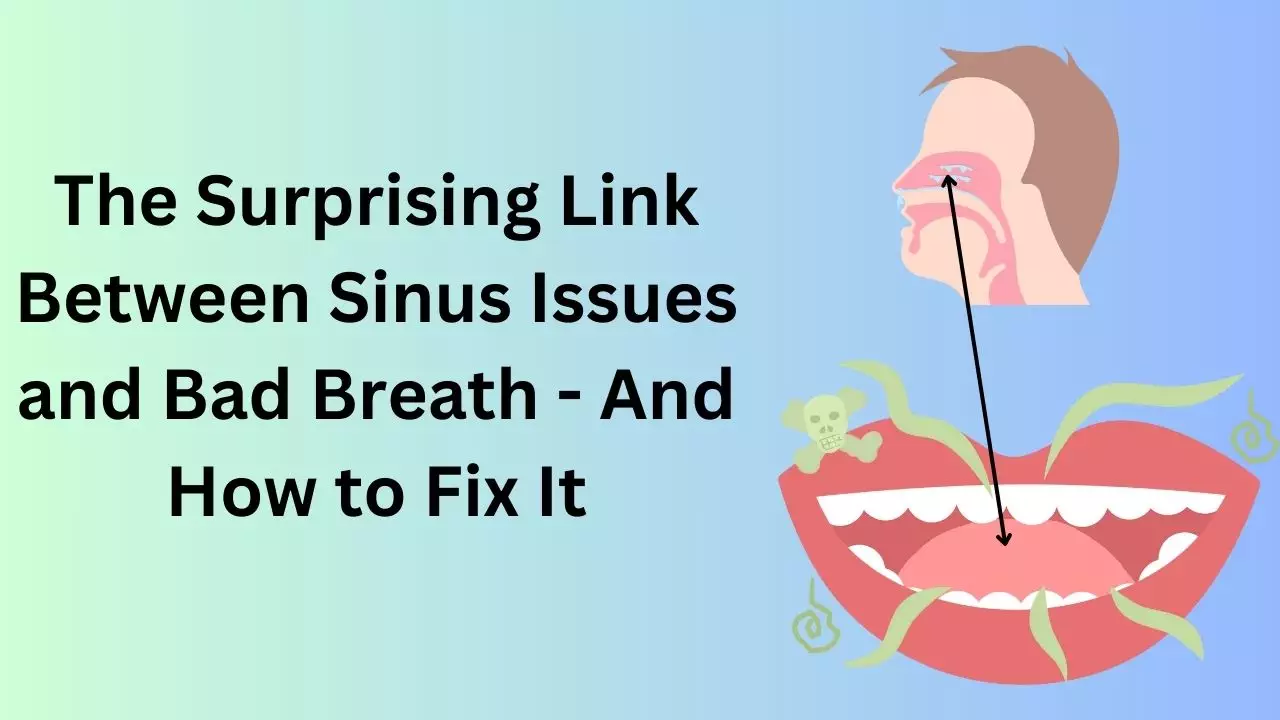
- The Science Behind Sinus Issues and Bad Breath
- Common Causes of Sinus Issues and Bad Breath
- How Sinus Infections Can Lead to Bad Breath
- The Role of Post-Nasal Drip in Causing Bad Breath
- Chronic Sinusitis and Its Effect on Breath Odor
- Other Sinus-Related Conditions That Can Cause Bad Breath
- How to Diagnose Sinus Issues and Bad Breath
- Treating Sinus Issues to Improve Bad Breath
- Home Remedies for Sinus Issues and Bad Breath
- Prevention Tips for Maintaining Good Sinus Health and Fresh Breath
Sinus issues and bad breath are two common health problems that many people experience. While they may seem unrelated, there is actually a strong connection between the two. Sinus issues, such as sinus infections or chronic sinusitis, can lead to bad breath due to the presence of bacteria in the sinuses. Addressing sinus issues is crucial for better breath odor and overall oral health.
Bad breath, also known as halitosis, can be embarrassing and affect a person’s self-confidence. It is often caused by the presence of bacteria in the mouth, but it can also be a result of sinus issues. When the sinuses become inflamed or infected, bacteria can accumulate and produce foul-smelling compounds that contribute to bad breath.
The Science Behind Sinus Issues and Bad Breath
Sinus issues can cause bad breath through a process known as anaerobic bacterial metabolism. When the sinuses become blocked or infected, they create an environment that is low in oxygen. This lack of oxygen allows certain types of bacteria to thrive and produce volatile sulfur compounds (VSCs), which are responsible for the unpleasant odor associated with bad breath.
These VSCs are released as waste products by the bacteria and can be detected in a person’s breath. The presence of these compounds gives off a foul smell that is often described as rotten eggs or sulfur-like. This is why individuals with sinus issues may experience chronic bad breath that does not improve with regular oral hygiene practices.
Common Causes of Sinus Issues and Bad Breath
There are several common causes of sinus issues that can contribute to bad breath:
1. Allergies: Allergies can cause inflammation in the sinuses, leading to congestion and blockage. This creates an ideal environment for bacteria to grow and produce foul-smelling compounds.
2. Nasal polyps: Nasal polyps are noncancerous growths that can develop in the sinuses or nasal passages. They can obstruct the sinuses and lead to chronic inflammation and infection, resulting in bad breath.
3. Deviated septum: A deviated septum occurs when the thin wall between the nostrils is displaced to one side. This can cause airflow problems and lead to chronic sinus issues, including bad breath.
4. Environmental irritants: Exposure to environmental irritants, such as smoke, pollution, or strong odors, can irritate the sinuses and trigger inflammation. This can contribute to sinus issues and bad breath.
How Sinus Infections Can Lead to Bad Breath
Sinus infections, also known as sinusitis, occur when the sinuses become infected or inflamed. This can be caused by a viral or bacterial infection, or as a result of allergies or other underlying conditions. Sinus infections can lead to bad breath due to the presence of bacteria in the sinuses.
When the sinuses become infected, bacteria can multiply and produce foul-smelling compounds. These compounds are released into the nasal passages and can be detected in a person’s breath. The longer a sinus infection persists, the more bacteria can accumulate and contribute to bad breath.
It is important to treat sinus infections promptly to prevent them from worsening and causing further complications. Antibiotics may be prescribed to eliminate the bacterial infection, while decongestants or nasal sprays can help reduce inflammation and relieve symptoms.
The Role of Post-Nasal Drip in Causing Bad Breath
Post-nasal drip is a condition where excess mucus drips down the back of the throat from the nasal passages. It is often caused by allergies, sinus infections, or colds. Post-nasal drip can contribute to bad breath because the mucus that drips down contains bacteria and other substances that can produce foul odors.
When excess mucus accumulates in the sinuses and nasal passages, it can become a breeding ground for bacteria. These bacteria can produce volatile sulfur compounds (VSCs), which are responsible for the unpleasant odor associated with bad breath. Additionally, the mucus itself can have a foul smell, further contributing to bad breath.
Addressing post-nasal drip is important for better breath odor. This can be done by treating the underlying cause, such as allergies or sinus infections. Over-the-counter antihistamines or nasal sprays may be recommended to reduce mucus production and alleviate symptoms.
Chronic Sinusitis and Its Effect on Breath Odor
Chronic sinusitis is a long-term inflammation of the sinuses that lasts for more than 12 weeks. It can be caused by recurrent sinus infections, allergies, or other underlying conditions. Chronic sinusitis can have a significant impact on breath odor due to the persistent presence of bacteria in the sinuses.
In chronic sinusitis, the sinuses remain inflamed and infected for an extended period of time. This allows bacteria to thrive and produce foul-smelling compounds that contribute to bad breath. The constant presence of these bacteria and their waste products can make it difficult to eliminate bad breath through regular oral hygiene practices alone.
Seeking medical attention for chronic sinusitis is crucial for better breath odor and overall health. A healthcare provider may recommend a combination of treatments, such as antibiotics, nasal corticosteroids, or saline rinses, to reduce inflammation and eliminate bacteria from the sinuses.
Other Sinus-Related Conditions That Can Cause Bad Breath
In addition to sinus infections and chronic sinusitis, there are other sinus-related conditions that can contribute to bad breath:
1. Sinus headaches: Sinus headaches occur when the sinuses become inflamed or congested, leading to pain and pressure in the forehead, cheeks, or around the eyes. The presence of bacteria in the sinuses can contribute to bad breath in individuals with sinus headaches.
2. Sinus pressure: Sinus pressure refers to the sensation of fullness or discomfort in the sinuses. It can be caused by allergies, sinus infections, or other underlying conditions. Sinus pressure can contribute to bad breath due to the presence of bacteria in the sinuses.
3. Sinus congestion: Sinus congestion occurs when the nasal passages become blocked or swollen, leading to difficulty breathing through the nose. This can create an environment that is conducive to bacterial growth and bad breath.
Addressing these sinus-related conditions is important for better breath odor and overall comfort. Treatment options may include medications to reduce inflammation, nasal irrigation, or other interventions recommended by a healthcare provider.
How to Diagnose Sinus Issues and Bad Breath
To accurately diagnose sinus issues and bad breath, it is important to seek medical attention. A healthcare provider will conduct a thorough evaluation and may recommend diagnostic tests, such as:
1. Physical examination: A healthcare provider will examine the nasal passages, throat, and mouth for signs of inflammation, infection, or other abnormalities.
2. Nasal endoscopy: A nasal endoscopy involves inserting a thin, flexible tube with a light and camera into the nasal passages to examine the sinuses and nasal cavity.
3. Imaging tests: Imaging tests, such as X-rays or CT scans, may be ordered to get a detailed view of the sinuses and identify any structural abnormalities or signs of infection.
4. Breath analysis: Breath analysis can be used to detect the presence of volatile sulfur compounds (VSCs) that contribute to bad breath. This can help determine if sinus issues are contributing to bad breath.
Seeking medical attention for accurate diagnosis is crucial for developing an appropriate treatment plan and addressing both sinus issues and bad breath effectively.
Treating Sinus Issues to Improve Bad Breath
Treating sinus issues is essential for improving bad breath. The specific treatment options will depend on the underlying cause of the sinus issues, but may include:
1. Antibiotics: If a bacterial infection is present, antibiotics may be prescribed to eliminate the infection and reduce inflammation in the sinuses.
2. Nasal corticosteroids: Nasal corticosteroids can help reduce inflammation in the sinuses and nasal passages, relieving symptoms and improving breath odor.
3. Saline rinses: Saline rinses or nasal irrigation can help flush out bacteria, mucus, and other irritants from the sinuses, promoting better breath odor.
4. Allergy medications: If allergies are contributing to sinus issues and bad breath, allergy medications may be recommended to reduce inflammation and alleviate symptoms.
It is important to follow the treatment plan prescribed by a healthcare provider to effectively address sinus issues and improve breath odor. This may involve taking medications as directed, using nasal sprays or rinses regularly, and making lifestyle changes to prevent recurrence of sinus issues.
Home Remedies for Sinus Issues and Bad Breath
In addition to medical treatments, there are several home remedies that can help alleviate sinus issues and improve bad breath. However, it is important to consult with a healthcare provider before trying any home remedies, especially if there are underlying medical conditions or concerns.
Some home remedies that may be beneficial for sinus issues and bad breath include:
1. Steam inhalation: Inhaling steam can help relieve congestion and open up the nasal passages, promoting better breath odor.
2. Warm saline rinses: Rinsing the nasal passages with warm saline solution can help flush out bacteria and mucus, reducing inflammation and improving breath odor.
3. Hydration: Drinking plenty of fluids can help thin mucus and promote better drainage from the sinuses, reducing the risk of bacterial growth and bad breath.
4. Herbal remedies: Certain herbs, such as eucalyptus or peppermint, have natural decongestant properties and can help alleviate sinus issues and improve breath odor.
It is important to remember that home remedies may not be suitable for everyone and should be used in conjunction with medical treatments as recommended by a healthcare provider.
Prevention Tips for Maintaining Good Sinus Health and Fresh Breath
Preventing sinus issues and maintaining good breath odor requires a combination of good oral hygiene practices and overall health habits. Some prevention tips include:
1. Practice good oral hygiene: Brushing your teeth twice a day, flossing daily, and using mouthwash can help remove bacteria and food particles that contribute to bad breath.
2. Stay hydrated: Drinking plenty of water can help keep the nasal passages moist and prevent mucus from becoming thick and stagnant, reducing the risk of bacterial growth and bad breath.
3. Avoid irritants: Minimize exposure to environmental irritants, such as smoke or strong odors, which can irritate the sinuses and contribute to bad breath.
4. Manage allergies: If you have allergies, work with a healthcare provider to develop an allergy management plan that includes avoiding triggers and taking appropriate medications.
5. Maintain a healthy lifestyle: Eating a balanced diet, exercising regularly, getting enough sleep, and managing stress can all contribute to better overall health, including sinus health and breath odor.
Conclusion:
Addressing sinus issues is crucial for better breath odor and overall oral health. Sinus issues, such as sinus infections or chronic sinusitis, can lead to bad breath due to the presence of bacteria in the sinuses. Understanding the connection between sinus issues and bad breath is important for seeking appropriate medical attention and following a treatment plan.
By addressing the underlying causes of sinus issues, such as allergies or nasal polyps, individuals can improve their breath odor and overall quality of life. It is important to seek medical attention for persistent sinus issues and bad breath, as a healthcare provider can provide an accurate diagnosis and recommend appropriate treatments.
In addition to medical treatments, home remedies and prevention tips can also be beneficial in maintaining good sinus health and fresh breath. However, it is important to consult with a healthcare provider before trying any home remedies or making significant lifestyle changes. With proper care and attention, individuals can effectively manage sinus issues and enjoy better breath odor.









